Chinese Foreign Ministry spokesman Guo Jiakun insisted on Friday that “fentanyl is the U.S.’s problem, not China’s.”
“The U.S. and the U.S. alone has the responsibility to solve it,” Guo said at a press briefing.
“Despite the goodwill China has shown, the U.S. slapped tariffs on Chinese imports and blames it on fentanyl. This is bullying through and through, and highly damaging to dialogue and cooperation on counter-narcotics,” he complained.
“The U.S. should know that vilifying others will not hide its failed responsibility, to punish those who try to help will not solve any problem, and intimidation or threats are certainly not the right way to engage with China,” he said.
Guo was responding to reports about slow progress in talks between U.S. and Chinese officials about curtailing China’s supply of precursor chemicals for the deadly fentanyl drug. U.S. officials told Reuters on Wednesday that the Chinese “are failing to negotiate in good faith.”
These officials said China is “exchanging intelligence about traffickers,” but its proposals to resolve the fentanyl crisis have been “inadequate.”
Also, while China might be willing to share intel about traffickers, it rarely takes serious action against illicit chemical manufacturers. This is partly because fentanyl precursor chemicals also have legitimate uses, and the Chinese government is reluctant to compromise the profits of their huge chemical companies.
“Start putting big, important people behind bars as a signal to the whole industry or black market. We just haven’t seen that,” one U.S. official said.
The Trump administration wants China to aggressively prosecute those who produce and sell fentanyl chemicals, while China is merely offering to regulate the chemicals a little more tightly. Even this offer seems largely rhetorical to U.S. negotiators, who said “talk is cheap,” but China never seems to do anything meaningful to shut down the chemical pipeline.
Trump’s first round of 20 percent tariffs on China in February was presented as punishment for China failing to take the fentanyl crisis seriously enough. China responded by saying it would do nothing further to “address the fentanyl problem” until the tariffs were lifted.
American officials noted that China is a member of the U.N. Commission on Narcotic Drugs, which unanimously agreed to place tighter controls on fentanyl chemicals at a March 2024 meeting in Vienna, Austria. China’s proposals to regulate more chemicals are, therefore, a “bad faith” offer to do something it already pledged to do over a year ago.
Pressed on the issue, Chinese officials have lately been repeating Guo’s talking point that fentanyl is entirely an American problem, even though no one disputes that most of the chemicals come from China.
The biggest change in fentanyl production since the first Trump term has been that China no longer ships the precursor chemicals directly to American drug dealers – instead, it ships the chemicals to Mexican cartels, who manufacture the fentanyl and smuggle it across the U.S. border. Fentanyl users and traffickers in the United States say there has been very little reduction in the supply of the drug since China promised to crack down on chemical producers.
President Trump mentioned China’s unsatisfactory performance on the fentanyl epidemic in a Truth Social post on Thursday, in which he also criticized the Chinese for not accepting the “beautifully finished planes” they agreed to purchase from Boeing.
China refused to take delivery on two Boeing planes on Wednesday in retaliation for Trump’s tariffs and said it would reject 50 more planes Boeing was scheduled to deliver in the coming year. Boeing CEO Kelly Ortberg said the company would have little difficulty selling most of the planes to other buyers, thanks to high demand.
“And, by the way, Fentanyl continues to pour into our Country from China, through Mexico and Canada, killing hundreds of thousands of our people, and it better stop, NOW!” Trump wrote.
Read the full article here


